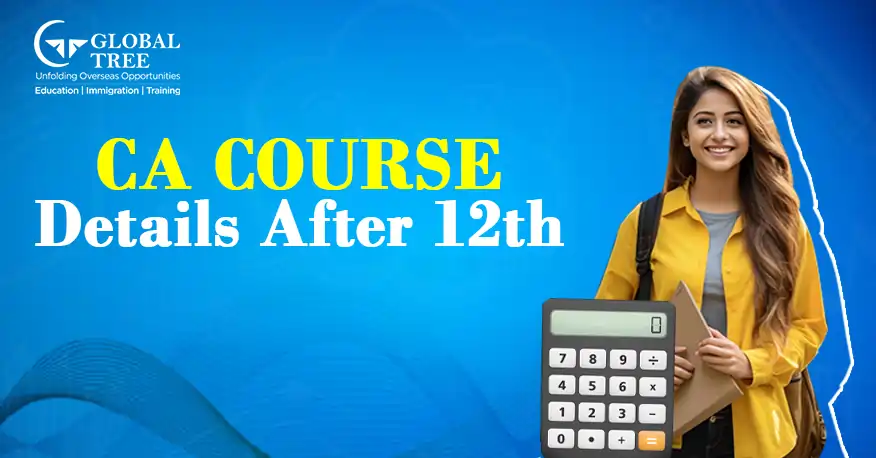All About CA Course Details After 12th: Your Path to Becoming a Chartered Accountant

Introduction
After you finish the 12th grade, you have to make a big decision about what you want to do with your life. A Chartered Accountant (CA) is one of the most respected and sought-after jobs in the business world. A Chartered Accountant (CA) is a financial expert who knows a lot about accounting, taxes, auditing, and managing money. This blog will tell you everything you need to know about the ca course details after 12th commerce and help you become a successful CA professional.
CA stands for Chartered Accountant.
A Chartered Accountant is a professional who helps people, businesses, and organisations with their finances and gives them advice. CAs do more than just crunch numbers. They are important for making smart financial decisions, making sure tax rules are followed, conducting audits, and offering strategic financial planning. Because they can do a lot of different things and are good with money, they are very useful in many fields.
Why choose CA as a Career?
The CA course is known all over the world and is very important in the business and finance worlds. It gives people a deep understanding of financial principles, laws, and practises, so they are ready to deal with difficult financial problems. During the course, students go through rigorous training and get hands-on experience. This helps them become professionals who are not only good with money but also have morals and integrity.
CA Eligibility after 12th:
If you want to become a Chartered Accountant right after finishing your 12th grade, you must meet the following requirements:
- You must have graduated from high school from a board that is known.
- You should have passed your 12th grade exam in the commerce stream. Some boards may also accept students from other streams.
- After passing the 10th exam or its equivalent, you must sign up with the Institute of Chartered Accountants of India (ICAI).
[Read more: Top courses to do after 12th Commerce]
CA course details after 12th: A Step-by-Step Guide
1. CPT Route after 12th Class:
The first step to becoming a Chartered Accountant is to pass the Common Proficiency Test (CPT). This test for newcomers is meant to test your basic knowledge and skills in four areas:
Fundamentals Of Accounting: This class is about the basic ideas, concepts, and practises of accounting. You'll learn about journal entries, keeping a ledger, the trial balance, and financial statements.
Mercantile Laws: Here, you'll learn about business and trade laws that apply to businesses. Contracts, the sale of goods, partnerships, negotiable instruments, and other things are covered.
General Economics: In this class, you will learn about economic ideas and theories, such as supply and demand, national income, inflation, and monetary policies.
Quantitative Aptitude: This part of the test looks at how good you are at maths and analysis. It talks about ratios, percentages, time and distance, probability, and permutation and combination, among other things.
The CPT is a multiple-choice test, and you have to pass it to move on to the next stage.
[Check out: Best career options without Maths after 12th Commerce]
2. Sign up for the Integrated Professional Competence Course (IPCC):
You can sign up for the Integrated Professional Competence Course (IPCC) once you have passed the CPT. This class is broken up into two parts:
Group 1: This group has classes like Accounting, which build on the basics you learned in CPT, Business Laws, Ethics, and Communication, which teaches you about the legal side of running a business, and Cost Accounting and Financial Management, which teaches you about how to figure out how much something costs and how to make financial decisions.
Group 2 is made up of three classes: Advanced Accounting, Auditing and Assurance, and Information Technology and Strategic Management. In Advanced Accounting, you'll learn about complex accounting standards and practises. In Auditing and Assurance, you'll learn about auditing concepts and methods.
[Know more: What are STEM courses? Why to pursue it in the USA?]
3. Internship or article:
If you pass Group 1 or both Groups of the IPCC, you have to do a period of practical training called "articleship." This is a very important part of the CA course, where you work with a real-world Chartered Accountant to gain real-world experience. During an articleship, which usually lasts three years, you get hands-on experience with different parts of accounting, auditing, taxes, and managing money. This real-world experience helps you understand theoretical ideas better and gets you ready for the challenges of your career.
4. Registration for CA's last course:
You can sign up for the CA Final course once you have finished your articleship and passed both groups of IPCC. There are two groups in this course:
Group 1: This group includes classes like Financial Reporting, where you'll learn about complex financial reporting standards, Strategic Financial Management, where you'll learn about making financial decisions in a strategic way, and Advanced Auditing and Professional Ethics, which builds on what you've already learned about auditing and focuses on ethical issues.
Group 2 includes Advanced Management Accounting, where you'll learn about advanced costing methods and management decision-making, Information Systems Control and Audit, which focuses on IT governance and controls, and Direct Tax Laws and Indirect Tax Laws, which cover income tax and goods and services tax, respectively.
[Also Read: Best Universities in the USA for a Finance Aspirant]
5. CA course details after 12th Fees:
The cost of the CA course depends on your level of study, where you live, and other things. The most accurate and up-to-date information on the fee structure can be found on the ICAI's website. Don't forget that the money you spend on your education is money you're putting into your future career.
6. How long does the CA course last?
The length of the CA course depends on a number of things, such as how long it takes you to pass your exams and finish your articleship. The whole CA course, from the CPT to the CA Final exams, takes about 4.5 to 5 years on average to finish.
7. Syllabus for CA:
The goal of the CA course syllabus is to give you a complete understanding of different financial and business topics. The curriculum covers a wide range of topics, such as financial reporting, auditing, taxation, ethics, law, management accounting, and information systems. With this all-inclusive curriculum, you'll be well-equipped to handle the many challenges of the financial world.
Every step of the CA course is carefully planned to give you the knowledge, skills, and real-world experience you need to do well as a Chartered Accountant. It's a journey that requires commitment, hard work, and a strong desire to do well financially. But a career in finance is well worth the work if you want to be respected and have a job that you enjoy.
[Do you like Australia: What you should know before applying to study in Australia]
CA Fee Structure
The cost of the CA course depends on how much you study and whether you are from India or another country. Please keep in mind that these fees are subject to change. For the most accurate and up-to-date fee information, please visit the Institute of Chartered Accountants of India (ICAI) website. As of my last update in September 2021, here is an estimate of how much it costs to take the CA course in India at each stage:
-
The cost to register for the CPT is between 6,000 and 7,000.
-
The cost to join the IPCC is between 9,000 and 10,000.
-
CA About 22,000 to 24,000 in final registration fees.
-
Fees to register for articleship are about 2,000 to 3,000.
-
Fees for the exam (per group): about 1,500 to 1,800.
-
Course fees for GMCS (General Management and Communication Skills) are about 6,500.
-
Cost of an advanced Information Technology Training (ITT) course is about 5,500.
-
Fees for the orientation programme are around 5,000.
-
Please remember that these numbers are just estimates and may have changed since I last checked. It is best to check the fees on the official ICAI website or by getting in touch with the institute directly.
CA Scope and what to do after CA:
Taking the CA course opens the door to a wide range of job opportunities in many different fields. The CA designation is respected and known all over the world, which gives you an edge in the job market. After becoming a Chartered Accountant, you can do some of the following things:
- Auditing and Assurance: If you are an auditor, you will look at financial records, statements, and systems to make sure they are correct and follow the rules. Auditors are an important part of keeping finances open and accountable.
- Taxes: CPAs are well-equipped to help people plan their taxes and give tax advice. As a tax consultant, you can help people and businesses understand complicated tax laws and figure out how to pay the least amount of taxes possible.
- Financial Planning and Analysis: Certified public accountants (CPAs) are good at analysing finances and can work as financial planners to help people and businesses make smart decisions about investments, budgets, and other money matters.
- Management accounting: In this job, you'll work closely with organisations to analyse financial data, make budgets, and give insights that help them make strategic decisions.
[Check out: list of All Professional Courses after 12th]
- Corporate Finance: Certified public accountants (CPAs) can work in corporations as financial managers, treasurers, or financial controllers. They oversee financial operations, manage funds, and make sure that the company's finances are stable.
- Consulting: Many CAs choose to work in consulting firms where they can use their skills in areas like risk management, reorganising finances, and valuing businesses.
- Entrepreneurship: Because CAs know a lot about money, some of them decide to start their own businesses and offer clients services like accounting, taxes, and financial advice.
- Academia and Teaching: If you love teaching and want to work in an academic setting, you can teach accounting, finance, or other related subjects.
- Opportunities in other countries: Because the CA designation is recognised around the world, you can look for jobs and gain experience in other countries.
- Public Sector: CAs are also valued in the public sector, where they work in government departments, regulatory bodies, and public financial management roles.
Not only does your CA qualification give you technical skills, but it also shows that you care about professional ethics and integrity. Different career paths show how flexible and in-demand CA professionals are in different fields. The CA qualification gives you the skills you need to succeed in the fast-paced world of finance and business, whether you want to work for a company, start your own practise, or find a unique niche.
Conclusion:
Becoming a Chartered Accountant is a long process that requires hard work, patience, and a real interest in money. The CA course after 12th gives you the knowledge and skills you need to do well in the complicated world of finance. By following the step-by-step guide in this blog, you can get through the different stages of the course and become a skilled and respected Chartered Accountant who is ready to help people and businesses with their finances.
FAQs
Do you need to take classes to pass the CA exams?
Coaching isn't required, but it can make a big difference in how well you do. Coaching institutes offer structured study materials, practise tests, and help from teachers with a lot of experience.
What is the percentage of people who pass CA exams?
The percentage of people who pass varies from exam to exam and from try to try. CA exams are known for being hard, so it's important to study consistently and with a clear mind.
What skills do you need to have to be a good CA?
In addition to a strong understanding of financial concepts, a successful CA needs to be able to communicate well, think analytically, pay close attention to details, and be honest.








